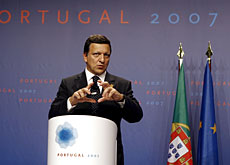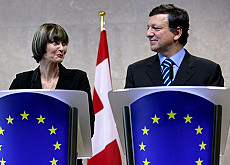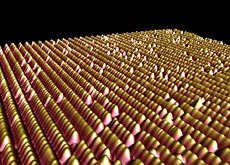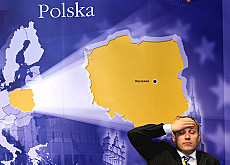Switzerland welcomes EU reforms

European Union leaders have struck a final agreement on a reform of the 27-nation bloc's ailing institutions following two years of negotiations.
Switzerland – which is not a member of the EU – says it is important to have a “well-functioning” partner for bilateral negotiations. However, experts are less enthusiastic about the reform.
“We welcome the deal which is aimed at making the EU more efficient and more democratic,” foreign ministry spokesman Lars Knuchel told swissinfo.
René Schwok of Geneva University says the deal struck in Lisbon is a typical compromise aimed at preventing member countries rejecting the accord in a referendum.
Its impact on Switzerland, which has concluded more than 20 major bilateral treaties with Brussels over the past five years, is expected to be limited.
“Nothing much is going to change for the relations between Switzerland and the EU because the fundamentals are the same,” says Schwok.
“Some people argue that it might become easier for Switzerland – as a federalist state – to deal with an EU with a more federalist structure. Personally I don’t agree.”
The EU reform agreement is better than nothing, but certainly no major step, he told swissinfo.
Transparency
Schwok believes that the reform is unlikely to lead to more transparency, democracy and efficiency than what the European Constitution was aiming for.
The constitution failed to win popular support, notably in referendums in France and the Netherlands.
The new treaty will take effect in 2009.
Provided it is ratified by all 27 member states, the EU will have a long-term president, a more powerful policy chief, a more democratic decision making system and more say for the European national parliaments.
“With this treaty, Europe is showing that the European project is on the move. Now we can look forward to the future with confidence,” said Portuguese Prime Minister José Socrates who chaired a two-day summit in Lisbon.
The treaty is not styled as a constitution. It omits any mention of an EU anthem or flag.
“We have said many times that reform is not an end in itself. With these institutions now, we can look after the most important priorities for our citizens,” said the European Commission President José Manuel Barroso.
Final wrangling
In the final wrangling on the details of the treaty, Italy won one extra seat in the European Parliament.
Poland won a guarantee that a provision allowing small groups of states to delay EU decisions could only be overturned by unanimity. It was also granted a permanent advocate-general’s job at the European Court of Justice.
The EU has spent a decade agonising over how to reform its institutions to cope with its near doubling in size from 15 to 27 members.
swissinfo with agencies
Switzerland is not a member of the European Union, but the EU is Switzerland’s main trading partner.
The government describes EU membership as a long-term option.
Switzerland and the EU have concluded more than 20 major bilateral accords. And moves are underway to negotiate deals on agriculture, electricity and science amid an ongoing dispute over the Swiss tax system.
Voters rejected the European Economic Area Treaty – a half-way house to EU membership – at the ballot box in 1992.
In the 1990s debate over Switzerland’s policy towards Europe polarised the national political landscape.
The treaty is not styled as a constitution and does not mention an anthem or a flag.
It will give its foreign and security affairs chief more clout on the world stage by giving him control over the aid budget and its extensive network of diplomats.
The EU president – elected by leaders of EU member states – is appointed for a five-year term.
The system replaces the current six-month rotating presidency.
In the future an exit clause will make it possible for nations to leave the EU.
The voting procedure is adapted to lower the threshold for approval, and matching the country’s voting strength to population.

In compliance with the JTI standards
More: SWI swissinfo.ch certified by the Journalism Trust Initiative



You can find an overview of ongoing debates with our journalists here. Please join us!
If you want to start a conversation about a topic raised in this article or want to report factual errors, email us at english@swissinfo.ch.